DVA Claims – Defence Force Members
We advise Defence Force members and veterans across Australia in relation to DVA claims, medical discharge and their entitlement to military compensation. If you need help securing your entitlements, register online here and we’ll contact you, or call TGB partner Tim White on 1800 730 842 .
We want to help you in the way you feel most comfortable.
As a Defence Force member or veteran, you have various entitlements to military compensation if you have been injured as a consequence of your service in the defence force (whether in Australia or overseas).
Our expertise and experience
For more than 20 years, our Military Compensation team has been advising current Australian Defence Force members and veterans who have been injured during the course of their service. We are proud to fight for those who have served our country, and our specialist team is passionate about protecting the rights of Defence Force members and veterans.
TGB’s Military Compensation team is led by Partner Tim White, who is a current serving Reserve Legal Officer, and has been a member of the Royal Australian Airforce (RAAF) for 20 years.
We have assisted clients from right across Australia and based overseas who have served in various conflicts including World War II, Korean War, Vietnam War, East Timor conflict, Iraq War, Afghanistan War and other conflicts in the Middle East.
Tim has prepared videos to answer some of your most frequently asked questions below:
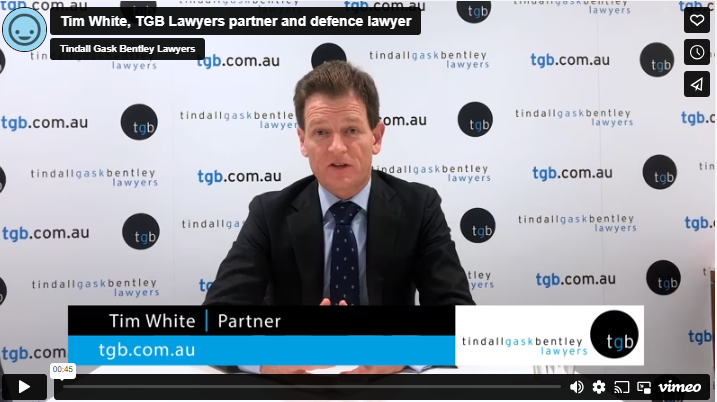
Introducing TGB Partner and Defence Force lawyer, Tim White
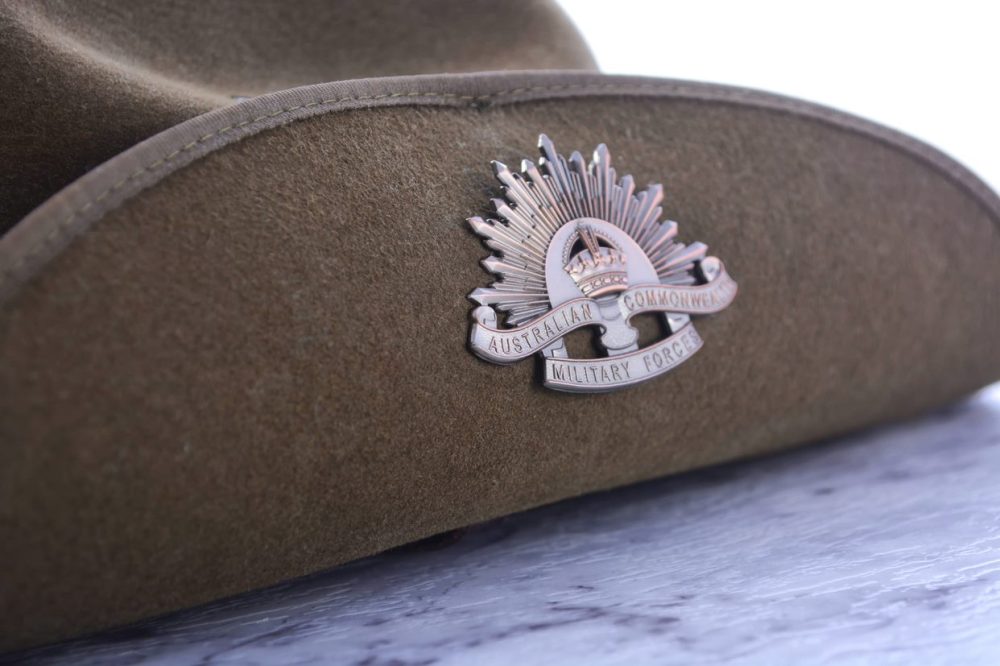
Why do I fight for injured Defence Force members?

Military Compensation claims - at what stage should you seek legal advice?

Lawyer vs volunteer? Seeking advice for your military compensation claim

Why is dealing with the Department of Veterans Affairs so difficult?
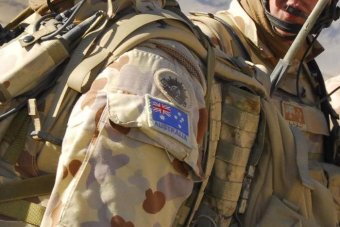
How can injured Defence Force Members & Veterans make it a fair fight for military compensation?
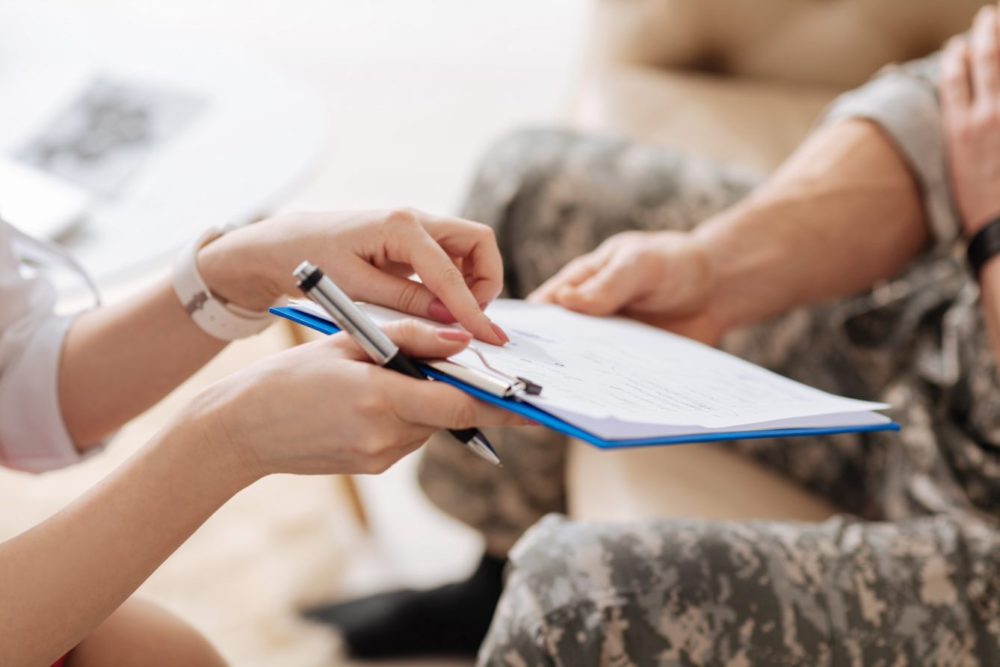
TGB's approach to legal costs - military compensation claims
Medical Discharge from the Australian Defence Force
For many Australian Defence Force members, a medical discharge is not just a change in employment – it is a significant life transition. If you have been medically discharged (or are in the process of being discharged) due to an injury or illness related to your service, you may have important entitlements under the military compensation system.
A medical discharge can trigger access to a range of benefits through the Department of Veterans’ Affairs (DVA), including liability acceptance for your conditions, treatment entitlements, incapacity payments, permanent impairment compensation and rehabilitation services. Understanding these entitlements early can make a major difference to your financial security and long-term wellbeing.
TGB Lawyers regularly assists ADF members who are navigating medical discharge, including those discharged under the DRCA, MRCA or VEA frameworks. Our role is to ensure your medical conditions are properly recognised, that your DVA claims are correctly prepared, and that you receive the full support available to you as you transition out of service. Whether your discharge is imminent, recently completed, or occurred years ago, getting the right advice early can protect your rights and strengthen your claim.
If you have concerns about how your medical discharge may affect your DVA entitlements, we are here to help. Contact our military compensation team for a free initial interview.
How we can help you.
-
Experts with more than 50 years’ experience
We’ve been helping injured people for more than 50 years. When you engage TGB to help you with your military compensation claim, you are in safe hands. TGB advises Defence Force members and veterans across Australia in relation to DVA claims and their entitlement to military compensation.
-
First interview free
Not sure if you are entitled to military compensation arising from your injury or illness that arose during the course of your service? Contact us today for an obligation-free chat! We offer a free initial interview, so you have nothing to lose. Usually, after a few simple questions, our DVA claims team will be able to tell you if you are eligible for compensation.
-
No win, no fee*
We understand that everyone’s financial circumstances are different. And often, after an injury or illness that occurred as a result of your military service, people can be under increased financial stress due to the inability to work, medical expenses and more. That is why, at TGB Lawyers, we don’t charge you for our legal fees until after your claim has been finalised. And if you don’t win? We don’t charge. It is as simple as that.
-
Recovery of legal expenses
In some circumstances, legal costs can be recovered from the DVA. We always try to recover as much of your legal costs as possible.
-
Focus on YOU
At TGB, our clients are at the centre of everything we do. We value building genuine relationships with the people we help. Compassionate, caring, cost-effective solutions and advice when you need it most.
Book your first FREE interview with us here. Or, you can call us on (08) 8212 1077 (South Australia), (08) 9211 5800 (Western Australia), (08) 8941 7814 (Northern Territory) or (07) 3373 0200 (Queensland).
The TGB difference.
Military compensation claims can be complex. It is important to obtain professional, experienced and specialised advice from the outset, prior to lodging a claim. This will give you the best chance of your claim being accepted.
If you have already lodged a claim which has been rejected, we may be able to assist you to appeal the decision. We have a very high success rate when it comes to challenging decisions by the Department of Veterans’ Affairs (DVA). There are strict time limits within which to lodge an appeal, so you will need to contact us swiftly! If you successfully appeal, most or all of your legal costs are paid by the DVA.
The below diagram outlines the claims process so you can have a better understanding of what to expect.
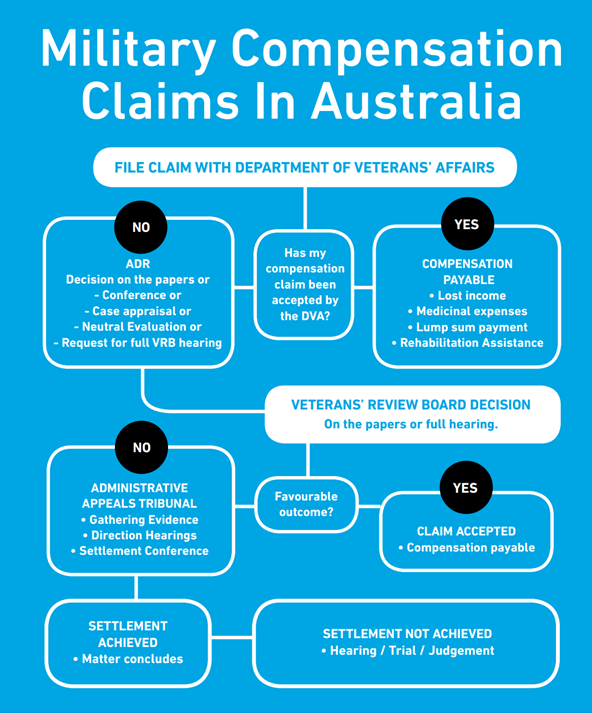
-
What can a Defence Force member or veteran claim Military Compensation for?
- Lost wages (ie base wage, allowances, penalty payments etc.)
- Medical expenses (ie medication, physiotherapy, hydrotherapy, surgery costs, consultations with doctors, rehabilitation costs, etc)
- Lump sum payment for permanent disability (which is currently not taxed)
- Household assistance costs
- Rehabilitation costs (eg re-training – university/TAFE courses, computer training etc. – associated costs with working towards alternative work opportunities)
- Lump sum payment for dependent spouse
-
Your injury could be deemed as occurring at work if:
- During lunch or other authorised breaks
- Whilst travelling to or from work
- At an approved work function (even on a weekend or outside “normal working hours”)
- Whilst travelling to a work function or an approved work activity
- Whilst participating in an approved sporting activity
- During a work training session
- When travelling to and/or from medical treatment for a work injury
-
What type of injuries are covered when seeking Military Compensation?
Numerous types of injuries are covered including physical injuries to your:
- neck,
- back,
- arms,
- legs,
- teeth,
- jaw,
- head, etc.
You are also covered for numerous diseases and medical conditions including:
- heart problems,
- cancer,
- dermatitis,
- respiratory problems,
- stroke,
- psychiatric/psychological conditions, and others.
-
Can I seek Military Compensation if my partner dies during military service?
If a Defence Force member dies as a consequence of his or her service, a dependent spouse is entitled to lump sum compensation. Often this claim is not straightforward and if you are unfortunate enough to be in this situation, you should seek legal advice.
-
Is there a time limit to claim Military Compensation?
The applicable legislation is complex and strict time limits apply. If you do not comply with the time limits your entitlements may be adversely affected. We will provide you with advice that is in your best interests.
-
Am I entitled to a lump sum Military Compensation payment?
If you sustain a permanent disability as a result of a work injury suffered whilst serving as a defence force member or as a consequence of this service, you may be entitled to a lump sum payment. Assessing a lump sum payment can be complicated. It is usually only paid once, so it is therefore important to seek legal advice about this claim. It is also a payment that is not taxed. Lump sum payments for permanent impairment can run into the hundreds of thousands of dollars.
If you have received a lump sum decision and feel it isn’t fair or adequate, speak with us. In many cases, we will advise you to dispute it. These lump sum claims involve considering different tables, and often the DVA understates the extent of the payment. We are frequently successful at obtaining increased payments for our clients by disputing these decisions.
-
What might a Military Compensation claim cost me?
As a Defence Force member or veteran, in many cases, we are able to recover most or all of your legal costs from the DVA. This limits what you then have to pay us. We can assist further by delaying your fees until any settlement is achieved. Before undertaking any work, we will send you a detailed letter setting our how we charge so you are completely informed. We are transparent about all things relating to your case, but especially costs.
-
Disputing a decision of the DVA
We specialise in advising Defence Force members, veterans and their families (when necessary) in disputing DVA decisions. We can assist at both the initial appeal to the VRB, and the subsequent appeal to the AAT, should it go that far. This can be a complex process and often involves technical legal issues. Accordingly, it is important to seek advice from a lawyer who specialises in this area of work.
We regularly represent Defence Force members at both the VRB and the AAT and have been doing so for more than 20 years.
Our firm has settled an extensive number of Military Compensation claims and has run numerous cases to trial when necessary.
If you need help taking a dispute to the VRB or AAT, register online here and we’ll contact you, or call TGB partner Tim White on (08) 8212 1077 . We advise Defence Force members and veterans across Australia on their entitlements to Military compensation.
-
What happens to my DVA entitlements if I am medically discharged?
A medical discharge does not reduce your entitlements – in many cases, it strengthens them. If your injury or illness is linked to your service, you may be eligible for compensation under the MRCA or DRCA, ongoing medical treatment, incapacity payments if you cannot work or can only work reduced hours, and permanent impairment compensation. TGB can help ensure all relevant conditions are claimed and properly documented.
-
Do I need to wait until I’m discharged before lodging a DVA claim?
No. You can lodge a claim while still serving, and in many cases it is advisable to do so. Early lodgement ensures your conditions are recognised as service-related before you separate from the ADF, which can make your transition smoother and ensure you have treatment and compensation in place when you leave. We can help you prepare your claims at any stage of your discharge process.
-
What support is available after I leave the ADF due to medical reasons?
Depending on your circumstances, you may be entitled to funded medical treatment, rehabilitation services, household and attendant care, income support, and compensation for permanent impairment. TGB can review your situation, explain your options and help secure the benefits you are entitled to under DVA legislation.